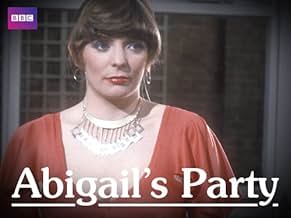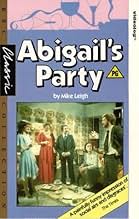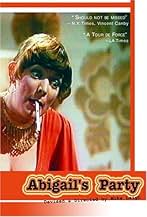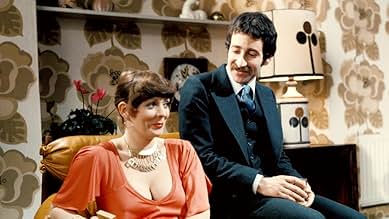Abigail's Party
- Episode aired Nov 1, 1977
- 1h 42m
IMDb RATING
7.9/10
2.5K
YOUR RATING
Arguably the most famous edition of Play For Today, and one of the most beloved, as Mike Leigh directs a comedy of manners. Middle-class suburbia gets to reveal its darker side over the cour... Read allArguably the most famous edition of Play For Today, and one of the most beloved, as Mike Leigh directs a comedy of manners. Middle-class suburbia gets to reveal its darker side over the course of an increasingly uncomfortable drinks party.Arguably the most famous edition of Play For Today, and one of the most beloved, as Mike Leigh directs a comedy of manners. Middle-class suburbia gets to reveal its darker side over the course of an increasingly uncomfortable drinks party.
- Director
- Writer
- All cast & crew
- Production, box office & more at IMDbPro
Featured reviews
A modern classic that explores the social deficiencies of the aspiring middle classes in the 70's...
Abigail's party is a tremendous piece of drama that was originally developed through a process of improvisation. It is hilariously funny but at the same time deeply moving and the tension created on stage is amongst the most painful I have ever witnessed. Mike Leigh, as a director, clearly has an amazing ability to achieve fantastic performances from his actors. The play, about an awkward drinks gathering, hosted by the atrocious Beverley (Alison Steadman), explores the intricacies of the social order in Britain and the pretentious aspirations of the lower middle class. With a heavy dose of Demis Rusoss, quite a few Gin an' Tonics, a cheesy pineapple stick and a dramatic climax - Abigail's Party is a much-watch. It may be a little dated but it still has a cult following and I hear that people today hold Abigail's Party parties:- So it must be good!
I reckon that this is the sort of movie that gets film students all excited. There are so many levels to this flick that you could probably go on for days pulling apart and examining the different characters, relationships and commentaries. But I recommend you watch this film purely for entertainment purposes - it's great. The actors are believable, the story is simplistic (yet so effective) and the period touches are great - because this is essentialy a period drama (the period being very firmly in the 1970s). For a film to have such little plot yet remain so compelling is testament to each and every element that makes up this movie. Watch it.
Watching Mike Leigh's Abigail's Party is like jumping into the past in the Seventies, when the play takes place. It's about a supposedly enjoyable party that soon becomes a hilarious and tragic disaster. And all is due to the ambition of being part of the middle class. The play is a portrait of people of that time, but nonetheless its themes are really up-to-date. For example, everything and everyone must be at Beverly's command so you can guess that it is unsafe to be victims of the desires of people like the cold-hearted Beverly, because events could take the wrong turn. This charming film is blessed with very talented actors who develop very peculiar characters. I really recommend it because it is clever thanks to the analysis of social reality and at the same time you can enjoy yourself with a good laugh.
The best bit (for me) is when Beverley is putting on Donna Summer's "Love to Love You" and fixing herself a drink at the beginning of the play. She puts the needle on the record and at the same time she opens the drinks cabinet's sliding door directly above her head with her spare hand in a smooth, perfectly performed robotic motion. She then sits to consume her drink and, with the look of a Basilisk, surveys her domain. It is her appearance which really startles. Her red dress is of the finest polyester, but exposes her flesh in unflattering ways. She sometimes looks like a jellyfish, with the tendrils flapping away, or like some monster who has made a dress out of the leftover bits of red meat of her victims. Either way, you are in no doubt that Beverley is the hostess with the mostest. You know you are in for trouble when her husband Lawrence comes in and she pipes up "Hi". It's done in such a dissatisfied, unloving way, that you can see she's going to kill him one way or another.
Mike Leigh's teleplay Abigail's Party is a character driven portrait of life in the suburbs in 70's Britain. It's about a drinks party hosted by a couple called Beverley and Laurence, attended by guests Ange and Tony, who have newly moved into the street, and Susan, a neighbour whose teenage daughter Abigail is having her own party at her house that same evening.
This is a party from hell. Beverly and Laurence are two of the most appalling hosts imaginable. While she is overbearing and ignorant, he is highly-strung and pretentious. They are two sides of the same coin though; where she likes throwaway pop music he likes classical, where she is fond of tacky erotic art he prefers fine art. At least Beverly's taste seems genuine, Laurence appears to choose things that makes him feel superior but it all seems purely for show, like his collected works of Shakespeare on which he enthuses about the quality of the jacket material, the contents he describes hilariously as unreadable. As the night progresses this pair of idiots battle amongst themselves in front of their guests creating umpteen squirm-inducing moments. The guests themselves are not much better. Ange is simple-minded and irritating, her husband Tony, taciturn and aggressive, while the third guest, the divorcée Susan, is stiff and stand-offish. Together they have the sort of chemistry that ordinarily in life comes with a toxic warning label.
Class is at the heart of much of the drama. Beverly and Laurence are a middle class suburban couple; Ange and Tony represent the lower-middle class, while Susan inhabits the upper-middle. Part of Beverley's reasoning behind the party is to induct Ange and Tony into her social strata. The latter couple are new to the street and seem to be from a lower income bracket; this allows Beverley to patronizingly take Ange under her wing. Susan, on the other hand, does not need to work as she is supported by her architect ex-husband and while she inhabits a level that Beverly aspires to, she clearly is not a happy woman. She still appears to be traumatized by her divorce and she seems to be very self-conscious in company. Although her discomfort in this social gathering does provide the audience with an identification figure of sorts, as most people would feel thoroughly uncomfortable in this car crash of a get-together.
Alison Steadman is tremendous as Beverly. This extremely well-crafted comic character is the dark soul of Abigail's Party. She is alternately fawning and unpleasant, but always selfish. She bullies her guests into doing exactly what she wants at all times, from insisting that everyone listen to the tacky music of Demis Roussos to forcing Ange and Tony to take cigarettes despite the fact they both are in the process of giving up. She forcefully prevents Susan from leaving to check on her daughter despite fuelling the flames of her paranoia by tactlessly implying that the kids would be running riot next door. Alison Steadman nails this character in a way that is firmly believable, she never descends into caricature. The rest of the cast are generally impressive too, the other standout being Janine Duvitski's portrayal of Ange. Through her various bits of inane dialogue, and her husband's gruff responses, she allows the audience to read between the lines and work out that her marriage is a terrible one but like Beverly she is no one-dimensional caricature, as by the end of the film she is the only character who really comes to the fore and ends the piece with any credit. Well-written dramas often confound expectations in this way.
One of the things I love about Abigail's Party is that it's a real period piece. The fashions, décor and music all scream 1977. But the drama is timeless, as the people are believable and the comic moments still subtly effective. It's the skillful mix of comedy with believable drama that is ultimately the key to its enduring success. The film ends in a very dark tone indeed, with the seemingly strong characters becoming weak and vice-versa. This tragicomedy doesn't play by conventional expectations and perhaps this is partly why it's so good.
This is a party from hell. Beverly and Laurence are two of the most appalling hosts imaginable. While she is overbearing and ignorant, he is highly-strung and pretentious. They are two sides of the same coin though; where she likes throwaway pop music he likes classical, where she is fond of tacky erotic art he prefers fine art. At least Beverly's taste seems genuine, Laurence appears to choose things that makes him feel superior but it all seems purely for show, like his collected works of Shakespeare on which he enthuses about the quality of the jacket material, the contents he describes hilariously as unreadable. As the night progresses this pair of idiots battle amongst themselves in front of their guests creating umpteen squirm-inducing moments. The guests themselves are not much better. Ange is simple-minded and irritating, her husband Tony, taciturn and aggressive, while the third guest, the divorcée Susan, is stiff and stand-offish. Together they have the sort of chemistry that ordinarily in life comes with a toxic warning label.
Class is at the heart of much of the drama. Beverly and Laurence are a middle class suburban couple; Ange and Tony represent the lower-middle class, while Susan inhabits the upper-middle. Part of Beverley's reasoning behind the party is to induct Ange and Tony into her social strata. The latter couple are new to the street and seem to be from a lower income bracket; this allows Beverley to patronizingly take Ange under her wing. Susan, on the other hand, does not need to work as she is supported by her architect ex-husband and while she inhabits a level that Beverly aspires to, she clearly is not a happy woman. She still appears to be traumatized by her divorce and she seems to be very self-conscious in company. Although her discomfort in this social gathering does provide the audience with an identification figure of sorts, as most people would feel thoroughly uncomfortable in this car crash of a get-together.
Alison Steadman is tremendous as Beverly. This extremely well-crafted comic character is the dark soul of Abigail's Party. She is alternately fawning and unpleasant, but always selfish. She bullies her guests into doing exactly what she wants at all times, from insisting that everyone listen to the tacky music of Demis Roussos to forcing Ange and Tony to take cigarettes despite the fact they both are in the process of giving up. She forcefully prevents Susan from leaving to check on her daughter despite fuelling the flames of her paranoia by tactlessly implying that the kids would be running riot next door. Alison Steadman nails this character in a way that is firmly believable, she never descends into caricature. The rest of the cast are generally impressive too, the other standout being Janine Duvitski's portrayal of Ange. Through her various bits of inane dialogue, and her husband's gruff responses, she allows the audience to read between the lines and work out that her marriage is a terrible one but like Beverly she is no one-dimensional caricature, as by the end of the film she is the only character who really comes to the fore and ends the piece with any credit. Well-written dramas often confound expectations in this way.
One of the things I love about Abigail's Party is that it's a real period piece. The fashions, décor and music all scream 1977. But the drama is timeless, as the people are believable and the comic moments still subtly effective. It's the skillful mix of comedy with believable drama that is ultimately the key to its enduring success. The film ends in a very dark tone indeed, with the seemingly strong characters becoming weak and vice-versa. This tragicomedy doesn't play by conventional expectations and perhaps this is partly why it's so good.
Did you know
- TriviaThe play got a huge audience on the Tuesday night it was screened in 1977. In the UK in those days there were only three TV channels: one (ITV) was on strike and the other (BBC2) was affected by a large storm causing all viewers to tune into the BBC station (BBC1) screening the play.
- GoofsDuring some scenes, most notable at the start the crew & in particular the sound boom man can be seen clearly reflected in actress Janine Duvitski's (Angela) large glasses.
- ConnectionsFeatured in Arena: Mike Leigh Making Plays (1982)
Details
Contribute to this page
Suggest an edit or add missing content
















